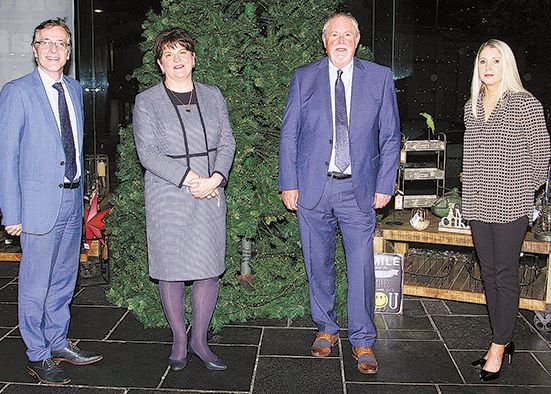Ex-First Minister says religion important part of political life
Ex-First Minister says religion important part of political life
24 November 2021

FORMER First Minister Arlene Foster has told an audience in Downpatrick she gets annoyed when people say religion should be taken out of politics.
Mrs Foster, who is a member of the Church of Ireland, said having a strong Christian faith should have a positive impact on politics.
In one of her first public appearances since she quit politics, Mrs Foster was interviewed by former UTV presenter Gerry Kelly in the Saint Patrick Centre last Thursday evening.
In front of a live audience, she opened up about her faith journey, her political career and the trauma of the Troubles.
“Christianity doesn’t call you to be neutral. It calls you to be salt and light about what you believe in,” she said.
“It does annoy me when people say you have to take religion out of politics and leave it at the door…like it only happens at the weekend. It is part of who you are.”
“Your Christianity and your faith is something that is with you all the time. You can’t just leave it at home on Sunday night and go out without it on Monday.”
Mrs Foster said she does not hold grudges against those who had hurt her, including former colleague Edwin Poots, who ousted her from the DUP leadership in May before being forced out of office himself just weeks later.
Reflecting on the decision by Sinn Fein to collapse the executive with the resignation of then Deputy First Minister Martin McGuinness in 2017, she said: “We got into a spiral and we couldn’t stop it and it got to a point then where the assembly collapsed and of course I regret that it was down for three years.”
She said she liked the late DUP leader Ian Paisley very much. “He used to joke with me and say, ‘How are the Anglicans doing Arlene’?”
Asked by Mr Kelly if she thought Dr Paisley had mellowed over the years, she said: “I never knew Dr Paisley personally until 2003/4 and I think he probably was in a different space than he had been in the Sixties, Seventies and Eighties.”
She declined to speculate on what might have changed him. “I don’t know. I can’t answer that. I only know he was very supportive of me as a female and an Anglican and as an outsider. He asked me to be in the administration in 2007 which I have always been very thankful for.”
Mrs Foster said her Christian faith helped her to seek common ground with people she did not agree with, adding that her reason for
going into government with Sinn Fein was to make sure that her children and others did not endure what she went through as a child.
This included the attempted murder in 1979 on her father, John, an RUC reservist, living on the Fermanagh border, and a bomb attack on her school bus driver in which her friend was left severely injured.
Recalling the gun attack on her father, when she was around eight years old, she said he came crawling back from the barn, after gunshots were fired, with blood dripping from his forehead.
“It was a very strange time,” she said. “My mother was sitting at the kitchen table and I don’t know what she was doing but I will never forget her face. She just froze.”
Ms Foster said it was not politically correct to say it, but she felt she benefited from being educated at an all-girl school, where she grew in confidence.
The former political leader said she was enjoying her new role in journalism as a presenter on GB news - but said more must be done to tackle the hurtful abuse on social media particularly against women.
Mrs Foster was welcomed by Dr Tim Campbell, director of the St Patrick Centre, who said her personal story was incredibly interesting.
He remarked: “Arlene Foster was extremely gracious and gave very generously of her time and people in the audience responded to her warmth.”


